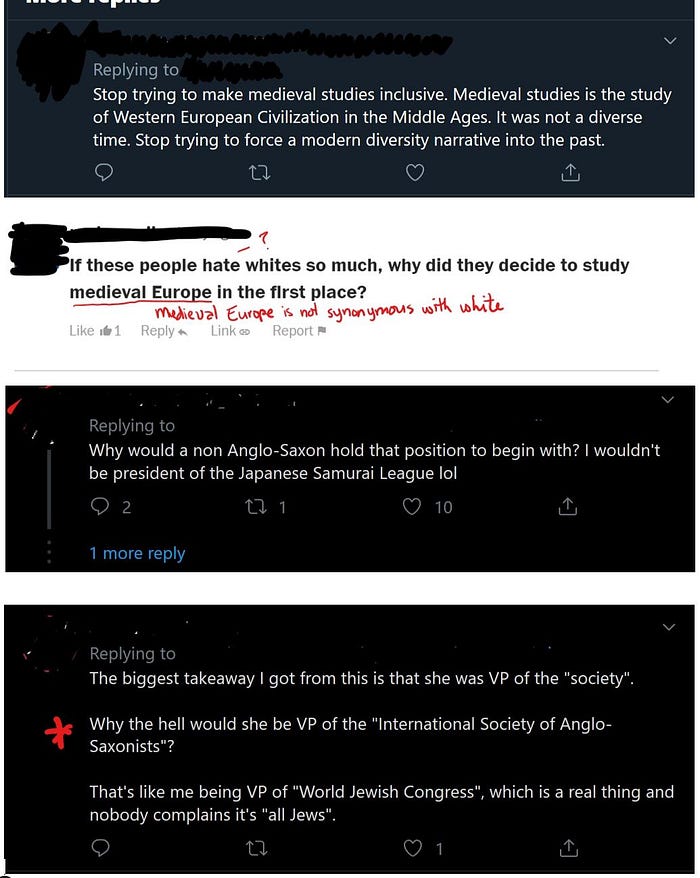
History Bites: Resources on the Problematic Term “Anglo-Saxon”. Part 1.
“We have to work with what bites into our existence.” — Stuart Hall
Welcome to your three-part series and list of resources on a very special topic close to my heart: the term “Anglo-Saxon.”
This is meant to be a resource and can be used as a cheat-sheet to teach with and/or learn from. As historians (in the broad sense of linguistic, literary, and material cultural), we often study the past to try and make sense of today’s world. In our quest, sometimes we discover our scholarly forefathers (or otherwise) were wrong in their conclusions. We update our scholarship based on new findings or reassess old material. This doesn’t mean that our goal is to manipulate the past. Reassessing terminology as in the case of “Anglo-Saxon” is an important part of updating our scholarship. This is similar to terms like “Oriental” and “Dark Ages” that are not typically used in scholarship anymore and are diminishing (and often corrected) in public discourse. This three-part series is a collection of works over the past year that you can use to learn, discuss and build on (links to part 2 and 3 are at the bottom of this post). I have tried to compile readings written or discussed by scholars from various fields in literature, history, archaeology, and art history.
If this overview is too long, you can find a Q&A primer here between me (MRO) and Olivia Waxman at TIME. Another piece to read if this is tldnr; at history workshop online here or this one by Erik Wade and myself for Smithsonian Magazine here. Links to a bibliography and additional reading material is in part 3.
PART ONE OF THREE:
Terminology
What we have discussed/debated over the last year in particular (but this discussion has been going on much longer) has helped people understand what’s at the core of this issue. The truth is that the term “Anglo-Saxon” has a history of misuse dating back to at least the 17th century. The term from that point was always synonymous with “white” and its global misuse endorsed a colonial agenda that had devastating effects for people on the receiving end of English imperialism. You can read about the history of the term here, here, and here.

Terms that are used to intentionally harm others are also something to consider. The facts that the term “Anglo-Saxon” has become synonymous with “white” when in fact that’s not historically accurate AND it is has been weaponized for racist purposes to harm and exclude others are reasons why we should consider the term’s use more carefully. It says a lot that scholars or laypeople are eager to defend a term that has been completely adopted into the rhetoric of white supremacists and English (or white) nationalists. Seeing ourselves as academics “above” the trivial concerns of scholars of color and/or falsely framing this issue as an “American” problem is irresponsible and lazy.

The Angles and Saxons existed, but they weren’t the only peoples on the island, nor were they the first. There was an amalgamation of peoples that migrated to the British isles, and it’s not like the two aforementioned groups were all that remained in a fight to the death between all those who settled. The popularization of the term only really surfaced in the early modern era along with racial and nationalistic notions that the term embodies for racists. People often question whether rethinking the term or thinking about race in the early English period is anachronistic, although the term “Anglo-Saxon” itself is anachronistic as it carries the baggage of 19th-century racial hierarchies. The question remains about when “anachronism” becomes a convenient tool to shut down discussion?
We often are told that it’s “anachronistic” to talk about race in the medieval period as we understand race now. Charges of this sort around anachronism are defensive posturing so that we don’t have to think about race. It also means one doesn’t have to think of their own whiteness and what that means in terms of how the field has been structured and how it operates. It’s a way to sidestep the topic of race altogether. The truth is that our field was founded on white supremacy. The claim of anachronism is a scapegoat where we pick and choose what we consider anachronistic. This selectiveness is something we should think about more deeply.
As early modernist Professor Ian Smith recently said “the charge of anachronism is a defensive posture which means that one does not have to think about race, which means one doesn’t have to think about one’s own race and one’s own whiteness and what that has meant to the constitution of the field” (see him speak about this at the 12-minute mark of the video below). You can watch Professor Smith’s full conversation with Folger Institute Executive Director Kathleen Lynch in full here:
Professor Smith’s points about re-examining pre-modern studies (particularly Shakespeare Studies) in terms of whiteness as opposed to blackness or otherness is beneficial for early English studies. “Otherness,” he says, “is a construct of whiteness.” What role has whiteness played in the construction of the field of early English studies? In its entire existence as a field, early English studies has been predominantly white (which is fine on its own, but for the mere fact that this has left the impression that the field is for white people only). Smith argues that “there has been a refusal to read race . . . because reading race would put that identity that racial identity, that racial ideology on the map and up for question.” This sort of thinking can undo the skepticism of wanting to talk about otherness in early English studies. It would force us to examine race in a different way and expose the protectionism that seems inherent in our field. This approach may allow us to see the whiteness in the field from its scholars to scholarly output and what is deemed worthy of research. Essentially, as otherness has been invisible in Old English studies (as in Shakespeare studies: for those who aren’t familiar with Old English it’s 1000 years older than Shakespeare, so no, it’s not the same thing), we might find it useful to examine the invisible whiteness of the field and its content. Smith adds that this approach is difficult because it forces white scholars to account for their role in the whiteness of the field and how it is taught and researched.
The Language and How to Use the Term:
Is there a historical context to use the term “Anglo-Saxon”? Yes. When you are quoting previous scholarship or a historical text where the term is used, you quote it as it was written.
“Anglo-Saxon” short-hand could make sense in certain contexts, but it is an oversimplification in MOST instances. It is not just lazy, it’s dangerous as it continues to frame the narrative of early English history around a white-washed and racist narrative. This particular heritage myth attempts to maneuver past and/or ignore the Norman conquest and those that settled and mixed with the early English after 1066. It also strips us of understanding the relationship and interactions with the Brittonic people in the early English period in Britain. “Anglo-Saxon” subsumes into shorthand all other groups and/peoples in an oversimplified way and says nothing of the Brittonic people and others who migrated or settled. Additionally, for people looking for a heritage story, the Angles, Saxons and Jutes in England were not indigenous.
John McWhorter’s “Our Magnificent Bastard Tongue” answers the question why people called themselves Angles and Saxons. The short answer is that Old English borrowed syntax, not lexis, from Brittonic/Welsh. They called themselves “English” because others started to call themselves English. Early Latin records (histories and chronicles) talk about Angli and Saxones, but the earliest English sources talked about the “Englisc” as an adjective, not a noun. See here for David Wilton’s article on the term. The words to describe the people were most commonly: “Angli” “Engle” “Angel-cyn” and “Englisc.” A good synopsis of McWhorter’s book can be found here.
Nineteenth-century philologists, historians, and racial theorists who were obsessed with pedigree tried to create a lineage that just doesn’t exist in the sources left to us. Some of us may write this issue about the term off arguing that we want to focus on Old English and nothing else. The problem with this thinking is that the very point of philology is to analyze the structure and historical development of words. Why wouldn’t we be interrogating “Anglo-Saxon” in terms of its nationalist, imperialist and colonialist history? Many arguments for not examining the term’s history serve to justify its continued use without facing or examining the racism in our field.

Many institutions, departments and individuals have committed themselves to adopting a more suitable term than “Anglo-Saxon”. This is promising. “Anglo-Saxon” was not used by the people in early England to describe themselves. Was it used in records (esp. Latin ones)? Yes. Was it used widely? No. There are 3 recorded instances in the entire corpus of Old English literature. Further reading is here by Erik Wade.

The term was first used in the 8th-century by Carolingian writers to “distinguish between the country of the Angli, in which Old English was rapidly becoming the dominant (though not sole) language, from areas on the European mainland in which other Germanic languages were most commonly spoken” (S. Oosthuizen, The Emergence of the English, p. 7). Susan Oosthuizen lays out an intriguing argument about the term (see Chapter 1 of her book) and reminds us that outdated and conventional explanations themselves become “problematic when new material can no longer be fitted into them or when they become a straight-jacket for rather than a facilitator of explanation” (p. 12).

People are willfully missing the point entirely if they think we would NOT use the term “Anglo-Saxon” in these cases. This has never been a campaign to remove the term from usage in historical documents, and anyone suggesting that is being disingenuous. So in those cases where the term was used, continue to use it for historical accuracy. Old textbooks and references should be used similarly and if one feels more comfortable using the term with quotations to signal its use in a historical context, then do so.

A small number of scholars signed a petition to keep the term in use, as though anyone was suggesting that historical documents should be “wited-out.” Truth is they have a monopoly on the wite-out already, not only in how the historical narrative has been white-washed, but also in what is acceptable research and who is accepted in the field. They doth protest too much.
Reassessing and re-examining the field while also looking at it in a different light is not meant to shut out more traditional or conventional research. The point of revisiting and interrogating the language and terms we use is no different than any other type of scholarship. By simply referring to ourselves as Old English experts or early English experts or Insular Saxon experts (or other options) makes more sense. This isn’t a crusade to remove the traditional, which is something that seems to have put some scholars on edge or on the defense. At least my intent isn’t to wipe the traditionalists out (and by traditionalists I mean those who work on topics that are more conventional or less theoretical-based), but as I recently discovered in the works of English Professor Gordon Houston (read about him here), our field has deprived itself of allowing others to connect with early English content for more than a century.
A more practical way to view this reassessment of “Anglo-Saxon” is to neutralize rather than to combat whiteness. It is in the wisdom of some of my BIPOC colleagues that I have come to better understand what this sort of work is all about. We shouldn’t view this as a war, as Dante Studies professor, Catherine Adoyo, recently mused to me. We are so familiar with a white-washed narrative that was meant to promote a racist agenda that we view anything outside that way of thinking with discomfort and somehow incorrect. This foreignness is always seen through the eyes of Euro-centrism which by default has always meant “white.” So this isn’t about erasing, this is about being more honest as scholars and shifting our gaze and focus. It’s about acknowledging a wider world and the interactions within and outside of Europe that have brought us to our present.
Context and Change:
Our world has always been one in flux in ways we don’t always understand, so we segment history and view periods in chunks to make greater sense of transitional phases. This brings up the question of whether our periodization dates too might need attention. We view the early English period as one unit, although it spans some 700 hundred years. The idea of calling it the “Anglo-Saxon” period has always struck me (and other scholars) as odd, considering the peoples that began to arrive in the fifth century only managed to establish a partial kingdom (even under King Alfred) which took hundreds of years to establish, and after waves of Viking attacks that inflicted England, it was never a real unified people. It was eventually conquered by the Normans in 1066, so the early English weren’t know for dominating anything in that regard. To pretend that DNA tests prove anything, take it from the experts like Susan Oosthuizen et al who call into question DNA testing since “conclusions are sometimes skewed to fit what is believed to be known about the adventus (the arrival of the Germanic peoples) rather than being based on the genetic evidence itself.” (p. 38). Oosthuizen uses the example that “a recent major study based on modern DNA samples identified migration into Britain from northern Germany, Denmark, and France in the middle of the first millennium. However, the authors excluded the French evidence from their interpretation of the results . . . that is, the researchers assumed that the migrations were Germanic and then skewed their results to achieve that predicted conclusion” (38). She goes on to collapse “Anglo-Saxon” ethnicity through a series of archaeological, genetic and linguistic evidence. Of course her argument is not perfect, but her work has brought to light how alarmingly outdated our use of the term is from outside of the usual “literary-based” discussion that often dominates. Archaeologist Duncan Sayer also makes a strong case with regards to DNA arguing that evidence from 5th- and 6th- century people “had a mixed heritage and did not base their identity on a biological legacy. The very idea of the Anglo-Saxon ancestor is a more recent invention linked closely with the English establishment.”

The field of Old English studies has been so adverse to including and reading theory, particularly in the UK. If that’s the case, then we should be reading our Old English texts as though we are engineers, understanding the inner-works of systems of structure: premise, form, tone, examples, style and the contextual questions. Where did each work arise? Why? What’s different now as we read in time and place? We dismantled the blunt instrument not only to see what it was made of but also how it was made. The nesting of place-making energies concentrated in print. Engineers doing and doing again. Not practice makes perfect but rather repetition differentiates and stops being repetition at some point. It’s not recital but rather rehearsal. This pushes us to a fresh appreciation of the object or text we have in front of us. At the end of each reading episode we realize we have to try things on to try it out. This brings us to how we “fit” in this field and how we function. By doing this, by allowing to see these texts in new light brings conviviality. Allowing us all to be speakers and participants, bringing value.
Another important question is what do we do with schoolbooks that refer to the early English as “Anglo-Saxons?” Can we change that? Yes. There are lots of terms that have fallen out of use or been updated or corrected in new curricula/textbooks. These sorts of changes may be slower. One thing that I have noticed is that the popular children’s series “Horrible Histories” used to use the term “Anglo-Saxon.” The writers are listening and I hope they know the important role they play in correcting language and educating children to be more precise with their own terminology. Kids learn about the various peoples, most notably the Angles, Saxons, Jutes and sometimes the Frisians. It may be easier to use the short-hand “Anglo-Saxons” but the weight of the term and its misuse today requires us all as educators in whatever capacity to be more responsible.
Click here for part 2.
A list of works cited and a cheat sheet biblio can be found in part 3.
